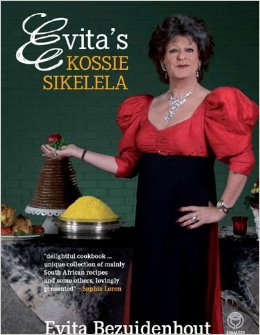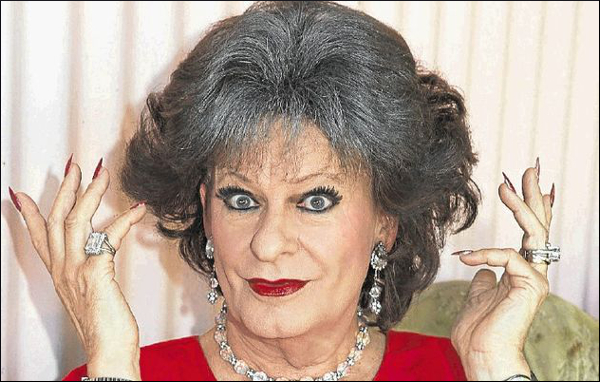
- Kossie Sikelela
- Published by: Random House Struik
- Level: Beginner
- First Published in: 2000
Evita Bezuidenhout (the alter-ego of South Africa's premier political satirist, Pieter-Dirk Uys) is an acclaimed chef, a national icon, and possibly the most popular woman in South Africa. She has traveled extensively and Kossie Sikelela is a collection of her favorite dishes, laid out like a journal.

Evita Bezuidenhout is the alter-ego of South Africa's premier political satirist, Pieter-Dirk Uys, and on top of being an acclaimed chef, an icon to the nation, and possibly the most popular woman in South Africa, Evita is the author of Evita se kossie sikelela (which references Nkosi sikelel' iAfrika or God Bless Africa, the National Anthem of South Africa).
"She also shares her own satirical experiences pertaining to each dish, offering the reader far more than a meal but a desire to visit the area and experience the diversity of South Africa and its cuisine."
Evita has traveled extensively and Kossie Sikelela is a collection of her favorite dishes, laid out like a journal. The majority of the recipes and illustrations are the work of Linda Vicquery, as Evita acknowledges in the book itself: “Special tribute to Linda Vicquery who did most of the work while I picked up most of the weight! Best in South Africa is better than best in the world!”
As her fake biography announces, during the 80s, Evita was South African ambassador in the independent black republic of Bapetikosweti, which is a fictional country. B'apeti could mean “bon appetit,” whlie kos is Afrikaans for “food,” swet might be “sweat,” and the “i” at the end could denote the negative. In Afrikaans, it is common to drop the “n” from “nie,” so Bapetikosweti could mean “no sweat for good food.” It could also be a reference to Bophuthatswana, which only apartheid-era South Africa recognized as a sovereign state.

The book uses Evita's own unique picturesque language by means of anagrams, puns, and Anglicisms. This is a delightful example of the book's style of writing: “Yzerfontein is only 20 minutes from Darling (where Evita lives), so I often take my grandchildren there for the day. We picnic and strandloop (strand = beach, loop = walk) and collect shells and driftwood for making things like picture frames and mobiles. I encourage them to collect their own lunch – it is great fun and also teaches them to be self-sufficient. Don't forget to buy a permit for collecting seafood and do take care not to exceed the official limits prescribed by the Marine Conservation officials.”
She discusses her recipes and gives some background information as to the origins of each one. She also shares her own satirical experiences pertaining to each dish, offering the reader far more than a meal but a desire to visit the area and experience the diversity of South Africa and its cuisine. The recipes are easy to follow, affordable, and most importantly, contain ingredients which are easily obtainable. Evita includes halaal dinners, children's recipes, bushveld cuisine, among many other examples. But what makes Evita's cookbook so unique is her controversial use of political, historical, and cultural details, some of which are so hectic, they fall under “Bad Taste” right at the end of the book.
"But what makes Evita's cookbook so unique is her controversial use of political, historical, and cultural details, some of which are so hectic, they fall under “Bad Taste” right at the end of the book."
“Winnie's Stompie ragout,” for example, is a delicious, mouthwatering mushroom recipe. It's introduced this way: “Today, I watched her [Winnie] from afar and I admire her in spite of my prejudices. And hope that she will never be President, because then she could solve all our problems with a gunshot. Or simply a soccer game.” This refers to what happened on December 29, 1988, when Winnie Mandela's bodyguards (a.k.a Mandela United Football Club) kidnapped four boys, including Stompie, on the grounds that they were police informers. Stompie was the only one to be brutally murdered, and his body was found near Winnie's house (Winnie is Nelson Mandela's ex-wife).
Proceeds from Kossie Sikelela go the The Darling Trust, a charitable trust fund founded by Pieter-Dirk Uys in support of the community of Darling, wh ich adopted Evita as their Fairy Gogo-mama. (Gogo means “bug”).

